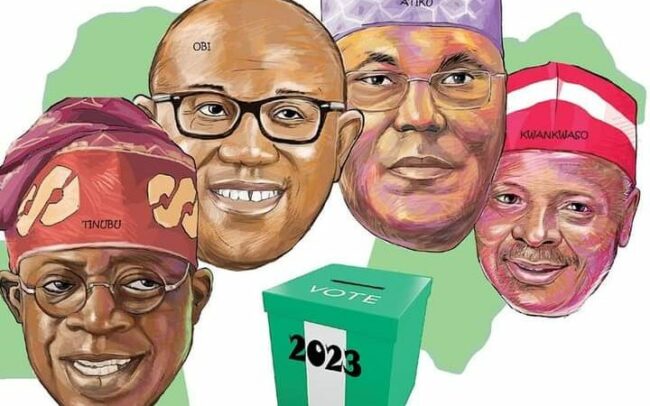It is no longer news that Nigeria, the most populous and largest economy in Africa with indelible marks on various countries and continents, held what some consider “controversial elections” on February 25, 2023, and March 18, 2023, respectively.
With over 90 million registered voters which consists of thousands of Internally Displaced Persons and several candidates in the rat race for 1500 elective seats, the conduct of these elections were incredibly complex, making the outcome of the votes even more important. Nigeria’s election has always been one of strategic interest, observed by all and sundry especially the international community.
Of no doubt, expectations were high because of the promise made by President Muhammadu Buhari, to give Nigerians a free and fair election that ought to have been a final parting gift. His signing of the Electoral Act 2022 further strengthened the hope and confidence of the electorates in the electoral system but the aftermath of the elections remains a bitter pill to swallow in the mouth of so many citizens.
This is 24 years of uninterrupted democracy but the rising public dissatisfaction by the electorates has been one of the hallmarks of great political apathy. One can see why the youths are more active in online political parties than offline politics yet, for the first time, the youths were resolute to choose their leaders, picked national interest over personal, ethnic, or tribal interest with many declaring that for the first time since they came of voting age, they stepped out to exercise their voting rights.
Violence has always been recorded in Nigerian elections. On March 28, 29, and April 11, 2015, Nigeria conducted her general elections where the APC presidential candidate, Muhammadu Buhari was declared winner, defeating the then incumbent president, Goodluck Ebele Jonathan of the PDP, (the first time an opposition party would defeat a sitting party in the history of presidential election in the country). That election was reportedly held amid rising tensions on account of incessant terror attacks by Boko Haram group. Associated Press reported that Boko Haram extremists killed 41 people including a lawmaker and scared hundreds of people from polling units in North Eastern Nigeria. They also reported that three persons including a soldier, were shot and killed in Rivers.
The 2015 presidential election lingered till the next day because of technical glitches with the biometric card readers provided by INEC and this raised numerous questions and doubts in the hearts of voters as to how prepared the country’s electoral commission is to handle the major task of conducting free and fair elections in the country.
Fast forward to 2023, they tried to allay the fears of the citizens by investing in new technologies which they swore would sweep the dust of election malpractices, lend credibility to the electoral process and prove to Nigerians her readiness and capability to handle an assignment of that magnitude, but this also failed woefully as the machines which were acquired failed to perform up to expectations and several discrepancies in results collated reared its ugly head. Similarly, the postponement of the 2023 gubernatorial election dampened public expectations as a result of the major outcry in various parts of the country even among political parties based on alleged rigging, brutalization, and irregularities in the February 25th presidential election, it little wonder the high rate of apathy on the parts of the youths two weeks later, the day of the scheduled gubernatorial election.
The presence of security personnel at voting centres has not been without criticism. Just like the 2019 and 2023 elections, armed security officers have been heavily alleged to be partisan, such that electorates perceive their presence as a strategy to intimidate voters rather than a beacon of hope. So many Nigerians including celebrities, took to diverse social media platforms to share videos of these brutalities meted out to them and other voters, this they did to buttress their claims.
Youths have at diverse times called for the implementation of various reforms to sustain a high rate of economic growth, fight the deplorable level of poverty, and everything that can be termed as ill in the country. The desire to change the status quo fueled the huge turnout of voters at various polling units but some were unfortunately met with strong resistance, especially from uniform men who were meant to be upholders of law and order.
It is worth to also note that the judiciary has been another source of controversy in Nigerian elections as studies have shown that the Nigerian judiciary can be truly compromised and become a tool for electoral manipulation (Onapajo and Uzidike, 2014).
It is therefore not surprising that citizens have lost confidence in the judiciary as regards electoral process in Nigeria. Owing to the numerous disturbing controversies of the 2023 presidential election, the two runners-up, Atiku Abubakar of the People’s Democratic Party, PDP and Peter Obi of the Labour Party, LP, firmly rejected the results despite the certificate of return issued to the President-elect, Bola Tinubu of the All Progressive Congress, APC, and respectively filed petitions at the Presidential Election Petition Tribunal, PEPT. Now all eyes are on the judiciary to demonstrate that it is indeed the hope of the common man.
A peaceful and transparent election in Nigeria has far-reaching advantages in the advancement and promotion of democracy in not just the country but also in Africa as a continent. This will not only strengthen leadership roles but will also be a catalyst against undemocratic transition. Free and fair elections with entrenchment of true democracy will breed better economic performance with accountable leaders who would not want to derail from servitude to the electorates but sadly, this is not so in Nigeria’s political sphere today. Successful completion of the process has positive implications for Nigeria’s international image as well as positive electoral template in the ECOWAS region. We are not there yet.
Rather than make her citizens lose hope in the system through lack of trust emerging from the cobwebs of terrible violence and conflicts, general elections should be nothing less than steps in the right direction for prevalence of democracy. It should be a sign of hope for growing democracy deficit. Nigeria’s over 200 million people deserve more than election marred by manipulation, intimidation, or injustice.
- Hilda Chikelue wrote from Port Harcourt
READ ALSO FROM NIGERIAN TRIBUNE






